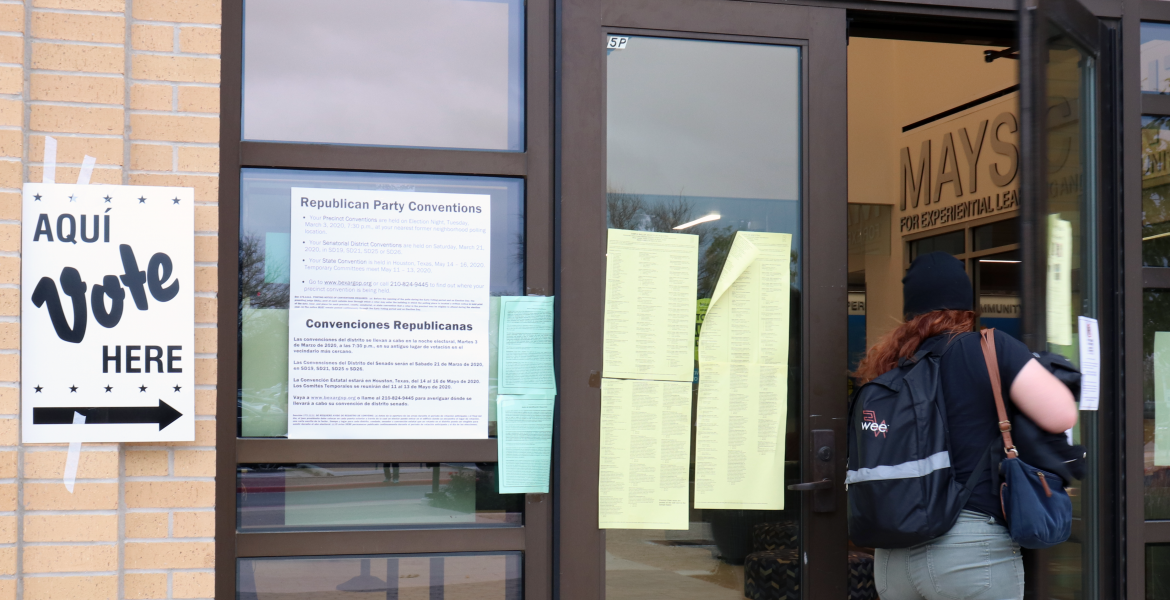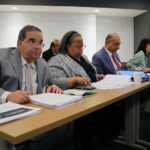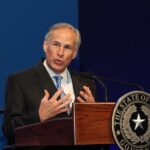This story was corrected on Feb. 22 to include weekend hours.
The Texas A&M University-San Antonio community and Bexar County residents can cast their votes on campus.
Early voting in the Democratic and Republican primary elections began Feb. 18 and continues through Feb. 28 in the west lobby of the Science and Technology Building outside the Mays Center. The primary Election Day is March 3.
The polling site on campus will be open from 8 a.m. to 5 p.m. Monday through Friday, 8 a.m. – 8 p.m. Saturday and 12 p.m. – 6 p.m. Sunday.
Texans will vote for their party’s candidates in races including U.S. President, U.S. Senate, congressional and legislative offices, the State Board of Education, Railroad Commissioner and judicial seats.
Edwin Blanton, executive director of the Mays Center for Experiential Learning and Community Engagement, said there will be signage all around campus reminding students, faculty and staff to vote on campus.
“One of the many things that we want to do is prepare students to be career ready, community minded, is to think about voting and how that can really make an impact on their community,” he said.
Are you registered to vote in a county you won’t be in during the March 3 primary? The last day to apply for a mail-in ballot is Feb. 21, according to the Texas Secretary of State’s website. Click here for information.
Blanton said the polling site opened in November 2019 and that over 200 people came and voted. The Nov. 5 election included state propositions, mayoral and council races in area cities, bond elections and other issues.
KSAT ranked the A&M-San Antonio voting site one of the least busy polling locations with only 138 people having voted on Feb. 18. The location with the biggest turnout was Brookhollow Library with 500 voters.
He said the university worked closely with Bexar County to get the voting site approved.
“It’s a lot more convenient for our students attending class to also just vote with faculty and staff. It really increases our voter rate by having such a wonderful convenient location right here.”
Sarah Kupcho, lecturer in political science, said it’s important for everybody to vote. She said otherwise citizens’ voices won’t be heard and they can lose their power.
“Politicians aren’t going to know what the next agenda is,” she said. “If something is important to them like social security, immigration or climate change, the way that you tell them is by voting and if you don’t vote, they’re not going to know, they’re just going to continue with the status quo.”
Kupcho said the Southside is underrepresented in voting due to the lack of polling places. She said with the new polling site, new voices will be heard.
“That’s the way that our democracy is going to be most successful, and if you want to facilitate change, the best thing you can do is go out and vote,” she said.
Philis Barragán Goetz, assistant professor of history, said voting is something students should be doing. She said it doesn’t matter who students vote for as long as they’re voting.
“I’ve had so many students enrolled in the class that it never occurred to them to register to vote, never occurred to them that they should vote or that’s anything that they should be participating in,” she said.
She said it’s not that students were angry or hated politics, it just didn’t occur to them to vote. She said she hopes voting numbers rise with the polling site on campus.
“Not only does it give students easier access to vote, they see it and it’s kind of more in their face,” she said.
Blanton said the Mays Center is hosting a primary watch party at the Game Room (Jaguar Lounge) inside CAB on March 3.
“We will also have our polling location open on other elections throughout 2020. The general election, which occurs in November, we’ll be doing various things including voter registration drives and just getting information out,” he said.
History senior John Suk said he plans to vote on campus during early voting. He said it’s important for the university to have a relationship with the community on civic engagement.
“I grew up in Iowa, so I was crazy about the caucuses,” he said. “It’s one of the most important things that citizens can do. Personally I don’t think you get the right to complain about politicians unless you vote, and I always like to complain about them. So I vote.”






